RAS AL KHAIMAH // The Shehhi dialect, widely spoken in mountain communities on the northern tip of the UAE, could disappear within generations, say scholars.
The dialect, derived from a South Arabian language, is incomprehensible to people not familiar with its rasping melody, unique vocabulary and grammar.
And while it may have deep and ancient roots it is in many ways a language of youth, celebrated and shared on internet forums and spoken as the dominant dialect in mountain communities where young people outnumber their elders.
"They came to establish a repertoire that they can shift between the dialect and their dialect as Shehhi," said Dr Maryam Bayshak, a linguist at UAE University who has studied the language for more than two decades.
"If you go onto the internet now, or you go and you read, you see that they are establishing a lot of forums and they explain to people what's their culture, what's their tradition. This is an open area for them to speak and to keep their own tradition and be proud."
In the long term, the Shehhi dialect faces the same risk of extinction as some other Emirati dialects.
"The United Arab Emirates has become a haven to a lot of people who are living here, and we tend to speak more towards standard Arabic than to go into the dialect when we converse. The Shehhuh is not an exception to that," said Dr Bayshak.
Migration for work and housing has already accelerated this process. "Everyone's living in the city," said Mohamed Abdullah Al Shehhi, 24, one of the founders of the Emirati culture and volunteer group Igrab. "The mountain guys are moving to the city, the coastal guys are moving to the city."
His family is one of hundreds that has left the coastal settlements at the foot of the mountains for new neighbourhoods in recent years. Their community is now a mix of Emirati accents. Like many men in the northern emirates, Mohamed works in Abu Dhabi, where he converses in a mix of languages and Emirati dialects.
"In future, I think it's not dangerous for Al Shehhi accent only, it will affect all accents and we will become a mixed, wide accent, joining all the society with only one accent. Maybe in about 100 years there will be no Shehhi accent."
Government support for heritage events has seen more formal festivals celebrating Shehhi culture, like Fujairah's Al Saif Traditional Sword Competition. In this mountain version of Pop Idol, entrants compete in a sword dancing contest to win SMS votes and impress a panel of judges.
But preservation of the Shehhi's mountain language and culture has mostly been from the ground up.
The country's formation in 1971 brought wealth and modernity that may see the erosion of the language in the long term. At the same time, community-based National Day celebrations have become some of the biggest annual reunions of Shehhi speakers.
These emulate traditional Shehhi weddings, minus the gunfire. Men announce their arrival by yelling a nadbah war cry, as adolescent boys hop before them and fling their swords into the air.
Men carry Shehhi fashion accessories including the yerz, a short-bladed mountain axe, and wear the Shehhi equivalent to a Swiss Army knife: silver tweezers and kohl eyeliner sticks that attach to the igal ropes of the headdress.
Desert and coastal tribes are always invited so that the culture is shared in a way that it could not be in the past. As a result, the language and culture is preserved through living, modern traditions that build on the old.
Mohamed believes his newborn son will learn the dialect, but in future generations it could be lost. But the culture, he says, will remain.
"Mostly now the jobs are in Abu Dhabi, so the movement there is taking our accent there also," he said. "We will lose some of our culture. Not all, but some of our culture. But for me, I think the important culture for the Shehhi is the ethics... dealing with people is not connected to a language for me. It is connected, but not too much."
azacharias@thenational.ae

